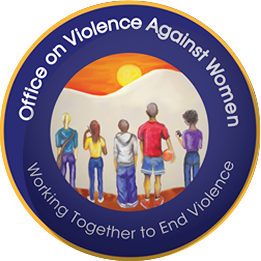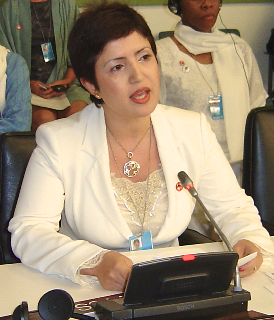Related Research Articles
Civil liberties are guarantees and freedoms that governments commit not to abridge, either by constitution, legislation, or judicial interpretation, without due process. Though the scope of the term differs between countries, civil liberties may include the freedom of conscience, freedom of press, freedom of religion, freedom of expression, freedom of assembly, the right to security and liberty, freedom of speech, the right to privacy, the right to equal treatment under the law and due process, the right to a fair trial, and the right to life. Other civil liberties include the right to own property, the right to defend oneself, and the right to bodily integrity. Within the distinctions between civil liberties and other types of liberty, distinctions exist between positive liberty/positive rights and negative liberty/negative rights.
Women Thrive Alliance, formerly Women Thrive Worldwide and Women's Edge, is a global feminist advocacy network created in 1998 that advocates for gender equality. Working with the grassroots organizations in 53 countries.
United States v. Morrison, 529 U.S. 598 (2000), is a U.S. Supreme Court decision that held that parts of the Violence Against Women Act of 1994 were unconstitutional because they exceeded the powers granted to the US Congress under the Commerce Clause and the Fourteenth Amendment's Equal Protection Clause. Along with United States v. Lopez (1995), it was part of a series of Rehnquist Court cases that limited Congress's powers under the Commerce Clause.

Christopher Henry Smith is an American politician serving his 21st term as the U.S. representative for New Jersey's 4th congressional district. Though it has taken various forms, his district has always been situated in central New Jersey. Currently, the district contains parts of Ocean and Monmouth counties.

The Violence Against Women Act of 1994 (VAWA) is a United States federal law signed by President Bill Clinton on September 13, 1994. The Act provided $1.6 billion toward investigation and prosecution of violent crimes against women, imposed automatic and mandatory restitution on those convicted, and allowed civil redress when prosecutors chose to not prosecute cases. The Act also established the Office on Violence Against Women within the U.S. Department of Justice.

The United States Office on Violence Against Women (OVW) was created following the Violence Against Women Act (VAWA) of 1994. The Act was renewed in 2005, 2013 and again in 2022. The Violence Against Women Act legislation requires the Office on Violence Against Women to work to respond to and reduce violence against women in many different areas, including on college campuses and in people's homes. VAWA requires Office on Violence Against Women to administer justice and strengthen services for victims of domestic violence, dating violence, sexual assault, and stalking.

Violence against women (VAW), also known as gender-based violence and sexual and gender-based violence (SGBV), are violent acts primarily or exclusively committed by men or boys against women or girls. Such violence is often considered a form of hate crime, committed against women or girls specifically because they are female, and can take many forms.

Widad Akreyi is a Kurdish health expert and human rights activist. She has co-founded the human rights organization Defend International and is the author of several books about both health issues and human rights.

The National Network to End Domestic Violence(NNEDV) is a 501(c)(3) not-for-profit organization founded in 1990, based in the District of Columbia. It is a network of state and territorial domestic violence coalitions, representing over 2,000 member organizations nationwide. The National Network to End Domestic Violence works to address the many aspects of domestic violence.

The Southern Africa region experiences a relatively high influx of immigration into South Africa. As of 2019, the immigration rate is continuing to increase, and the role of the female population of migrants is significantly growing in this movement and settlement. The majority of immigrants are working residents and influence the presence of several sectors in South Africa. The demographic background of this group is diverse, and the countries of origin mainly belong to Sub-Saharan Africa and push migration south. A portion have qualified as refugees since the 1990s.

Eswatini, Africa's last remaining absolute monarchy, was rated by Freedom House from 1972 to 1992 as "Partly Free"; since 1993, it has been considered "Not Free". During these years the country's Freedom House rating for "Political Rights" has slipped from 4 to 7, and "Civil Liberties" from 2 to 5. Political parties have been banned in Eswatini since 1973. A 2011 Human Rights Watch report described the country as being "in the midst of a serious crisis of governance", noting that "[y]ears of extravagant expenditure by the royal family, fiscal indiscipline, and government corruption have left the country on the brink of economic disaster". In 2012, the African Commission on Human and Peoples' Rights (ACHPR) issued a sharp criticism of Eswatini's human-rights record, calling on the Swazi government to honor its commitments under international law in regards to freedom of expression, association, and assembly. HRW notes that owing to a 40% unemployment rate and low wages that oblige 80% of Swazis to live on less than US$2 a day, the government has been under "increasing pressure from civil society activists and trade unionists to implement economic reforms and open up the space for civil and political activism" and that dozens of arrests have taken place "during protests against the government's poor governance and human rights record".
Victims' rights are legal rights afforded to victims of crime. These may include the right to restitution, the right to a victims' advocate, the right not to be excluded from criminal justice proceedings, and the right to speak at criminal justice proceedings.
The Republic of Uruguay is located in South America, between Argentina, Brazil and the South Atlantic Ocean, with a population of 3,332,972. Uruguay gained independence and sovereignty from Spain in 1828 and has full control over its internal and external affairs. From 1973 to 1985 Uruguay was governed by a civil-military dictatorship which committed numerous human rights abuses.
The Campus Accountability and Safety Act (CASA) was a bill introduced in the 114th United States Congress with the goal of reducing sexual violence on college and university campuses. First introduced in 2014, a revised bill was introduced in February 2015 by Senator Claire McCaskill of Missouri with nine bi-partisan cosponsors. 43 cosponsors eventually signed on. The bill died in committee at the end of the session without reaching a floor vote in either house.

The SAFE Act was a United States legislative proposal for Syrian and Iraqi refugees that would require extra background investigation before entry into the US.
Many people migrating from Latin America to the United States are victims of sexual assault and sex trafficking in Mexico. People who migrate through or from Mexico without legal permission must enter into dealings with smugglers and, often, criminal gangs. Perpetrators may be smugglers or gang members, but can also be government officials, bandits, or other migrants. Sexual assault is sometimes part of the "price" of smuggling, and some women have reported preparing for it in advance by taking contraception.
Human rights in the Kingdom of Denmark are protected by the state's Constitution of the Realm (Danmarks Riges Grundlov); applying equally in Denmark proper, Greenland and the Faroe Islands, and through the ratification of international human rights treaties. Denmark has held a significant role in the adoption of both the European Convention on Human Rights and in the establishment of the European Court of Human Rights (ECHR). In 1987, the Kingdom Parliament (Folketinget) established a national human rights institution, the Danish Centre of Human Rights, now the Danish Institute for Human Rights.
The boyfriend loophole is a gap in American gun legislation that allows access to guns by physically abusive ex-boyfriends and stalkers with previous convictions or restraining orders. While individuals who have been convicted of, or are under a restraining order for, domestic violence are prohibited from owning a firearm, the prohibition only applies if the victim was the perpetrator's spouse or cohabitant, or if the perpetrator had a child with the victim. The boyfriend loophole has had a direct effect on people who experience domestic abuse or stalking by former or current intimate partners. The Lautenberg Amendment of 1996 made stricter restrictions on gun control in the US; however, the definitions of "intimate partner" brought about this loophole. Several states tried closing it by legislation, but were generally not successful. However, new federal legislation, the Bipartisan Safer Communities Act, signed into law on June 25, 2022, significantly narrows the boyfriend loophole, denying access to firearms for five years to people convicted of violence in dating relationships, but not for those with only restraining orders.
Human rights in Norway protect the fundamental rights of all persons within the Kingdom of Norway. These rights are safeguarded by Chapter E of the Constitution of Norway or Kongeriket Norges Grunnlov, as well as the ratification of various international treaties facilitated by the United Nations. The country maintains a dedicated commitment to human rights and was the second country to ratify the European Convention on Human Rights.
References
- 1 2 3 4 The International Violence Against Women Act (I-VAWA) (S.2982, HR. 4594). Archived 2016-03-03 at the Wayback Machine Amnesty International Issue Brief No. 2. March 2010. Retrieved November 23, 2011.
- ↑ McElroy, Wendy (February 11, 2014). "I-VAWA's global lie". The Hill.
- ↑ International Violence Against Women Act Organizational Supporters. Archived 2012-04-24 at the Wayback Machine Women Thrive Worldwide. Retrieved November 23, 2011.